Ruslan Bodelan: what did the former owner of Odessa not repent of? PART 1
For two decades, Odessa was torn between corrupt and criminal clans fighting for power in the city: one was headed by former Communist Party official Ruslan Bodelan, the other was headed by former “democratic communist” Eduard Gurvits. “Odessa elections” were synonymous with lawlessness and falsification. The methods by which they achieved power raised the hairs of readers of crime chronicles. And their allies were on the lists of law enforcement agencies in Ukraine and Europe as members of the international mafia, thanks to control over the ports. However, none of them received the deserved punishment.
After Ruslan Bodelan fled in 2005, he was practically not seen in Odessa for more than 10 years, he visited his homeland only occasionally and almost incognito. But in 2016, the ex-governor and ex-mayor appeared at a public event at the Literary Museum, where in a narrow circle of old acquaintances, officials and businessmen, he presented his next book, “Forgive me, Odessa residents.” Published in a circulation of 2 thousand copies, it never became a bestseller. Perhaps because under the cover with a loud title there was not a sincere confession of one of the most corrupt mayors of Ukraine, but, as noted Skelet.Infoanother portion of political chatter about nothing, complaining about “lost victories.” Her former owner never really wanted to repent of his sins before Odessa…
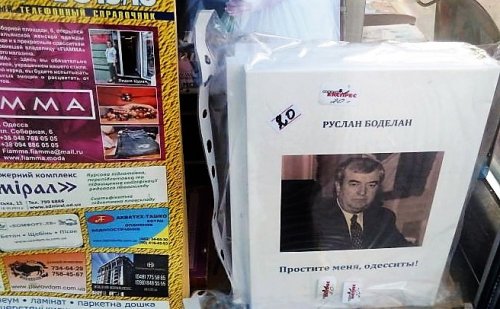
Rusla Bodelan’s book of repentance never became a bestseller
Ruslan Bodelan. Komsomol tribe
Bodelan Ruslan Borisovich was born on April 4, 1942 in the village of Berezovka, Odessa region (then it was Romanian Transnistria) in the family of school teachers Boris Fokich and Galina Petrovna Bodelan. His early biography is replete with oddities, similar to absurdities. So, at the age of 17, after graduating from high school, Ruslan Bodelan himself became a physical education teacher at a school in the village of Gvozdavka, Lyubashevsky district. At the age of 23, he became the first secretary of the Kiliya district committee of the LKSMU. But Bodelan graduated from the Pedagogical Institute only at the age of 26, and in the distant Kazakh Petropavlovsk – after which he returned to Ukraine again and began working in the Central Committee of the LKSMU. All this is explained by the young Bodelan’s extraordinary organizational skills: from his school desk, he was a genius at leading pioneer and Komsomol meetings, party assets and economic planning meetings. This is precisely why he was put in charge, so he needed a teacher’s diploma only as a formality. And his second higher education was the party school under the Central Committee of the Communist Party of Ukraine. This is how, as not a specialist, not a professional, but only a gifted chairman, Bodelan made himself a wonderful leadership career in the USSR.
In 1973, he headed the Odessa Regional Committee of the Communist Party of Ukraine, in 1979 he sat in the chair of the first secretary of the Central District Committee of the Communist Party of Odessa, in 1984 in the chair of the first secretary of the city committee of the Communist Party of Ukraine – becoming the rightful owner of the city. It was then that Bodelan made all the useful connections that would later come in handy for him in the 90s. And these were connections not only with directors of enterprises, port chiefs, law enforcement officers and customs officers, but with the criminal world of Odessa – distinguished by its motley diversity, and even then oriented abroad.
“Perestroika” not only did not blow Bodelan away from his chair with the winds of change, but also elevated him in 1990 to the first secretary of the regional committee – in Soviet times this was an excellent career, higher ones only went to republican departments or to Moscow. However, the Soviet system was already falling apart, and in January 1991 Ruslan Bodelan prudently headed the Odessa Regional Executive Committee, and in 1992, at the by-elections in Kiliya district No. 311, he received the mandate of a people’s deputy (he would also win the 1994 elections there).
But his subsequent flight from Odessa to the Verkhovna Rada was not the result of the overthrow of the Communist Party owner of Odessa “from below,” but not the established relationship with the “top,” with President Leonid Kravchuk. In March 1992, Valentin Simonenko was appointed to replace Bodelan at the head of the region, who, however, quickly “flew” to Kyiv for a promotion. But Bodelan “vegetated” for two years, until in 1994 he won the gubernatorial elections (the first and last in the history of Ukraine), taking 57.96% of the votes and beating Vladlen Ilyin, his former subordinate, who headed the regional administration in 1992-94. Even those elections were characterized as an extremely tough fight: despite the fact that Bodelan and Ilyin and a number of other candidates came from the Odessa regional committee and city committee of Soviet times, behind each of them there were already their own groups in Odessa, and each found their own “roof” in Kyiv.
Almost no one remembers in detail what Bodelan and Kravchuk did not share between themselves at the beginning of 1992. Extant sources Skelet.Info Several possible reasons are cited. Firstly, after the Crimean region won the status of an autonomous republic (within Ukraine) in 1991, ideas of autonomy arose in the heads of the leaders of Donbass, Kharkov, Transcarpathia and Lvov, Odessa and Kherson. Few people dared to directly blackmail Kyiv, only those who had self-reliance: for example, the “miner leader” Efim Zvyagilsky. Ruslan Bodelan then, at a minimum, expressed either the idea of a federation of autonomous regions, or the status of a “free city” for Odessa. And he could well move from fantasies to unsupported demands – which angered the first president. This allegedly also angered the Rukh party, whose leaders began to demand that Kravchuk remove the “pro-Russian separatist” Bodelan from his post.
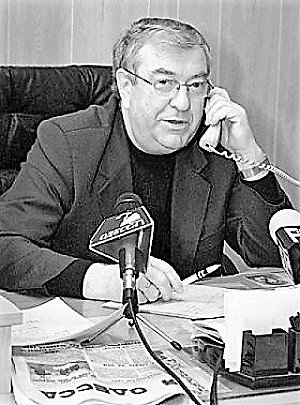
Ruslan Bodelan: what did the former owner of Odessa not repent of? PART 1
In addition, Bodelan was also accused of tacitly but actively supporting the separatists of Transnistria – which had been in rebellion since 1989. Moreover, Bodelan’s removal from office occurred literally a few days before the start of Moldova’s military operation against the PMR.
The second possible reason was the beginning of the division of post-Soviet property, primarily the Black Sea Shipping Company (BSC). The former Komsomol member was not at all offended for the state, but Bodelan had his own interests in the ChMP property, primarily coastal real estate. Meanwhile, back at the end of 1991 in Kyiv, high-ranking officials were pushing each other with their elbows in order to lease a couple of dozen private sea fleet ships to offshore companies. In addition, Odessa has two large cargo seaports through which huge flows of goods, including smuggling, passed. And officials, rapidly developing business, and crime, including international ones, sought to control it. And it was he who played a big role in the life of Odessa in the 90s.
Ruslan Bodelan. Bloody decade
Bodelan’s return to the chair of the head of the Odessa region took place against the backdrop of the division and redistribution of spheres of influence in the region. There was a monstrous tangle of interconnected organized crime groups, business groups and bureaucratic clans that attracted allies from everywhere: from Kyiv, from Moscow, from America and Israel. One of the centers of the bloody confrontation was the oil region of the Odessa port and the Odessa oil refinery, the struggle for which largely determined the balance of power in the city for the next twenty years.
Ruslan Borisovich has a very old and very close acquaintance, Ivan Grigorenko, who in the 80s also made a rapid career: from a local police officer to the head of a department of the regional Main Directorate of the Ministry of Internal Affairs. Since 1990, Grigorenko supervised the criminal “authority” who was released after a 12-year imprisonment. Alexandra Angert (nickname Angel)which, according to several sources Skelet.Inforeceived parole for his willingness to cooperate with authorities. At the very beginning of the 90s, Angert became the “vassal” of Victor Kulivar (nickname Karabas), the most respected Odessa “authority” at that time. But at the same time, Angert began to create his own “brigade” and established close contacts with the international mafioso Leonid Minin, who was involved in smuggling weapons and drugs, exporting metals, and trading in petroleum products. This is how a criminal community controlled by Minin arose consisting of Alexander Angert (“authority”), Alexander Zhukov (businessman, friend of Minin and Angert) and Gennady Trukhanov (he headed the security, trained militants and formed groups of “titushki”).
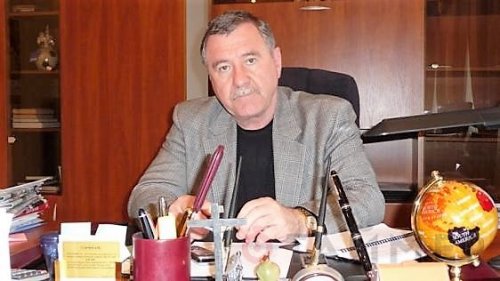
Ivan Grigorenko
Minin-Angert-Zhukov needed the Odessa oil port and refinery, but they were also claimed by the Chechens – emissaries of Dudayev’s Ichkeria, which declared independence, in need of selling their oil. Chechens in Odessa itself relied on the new mayor Eduard Gurvitsand in Kyiv – against the “Rukhovites” of the Ukrainian Foreign Ministry, representatives of the American embassy and the head of the Ukrainian branch of KPMG Katerina Chumachenkon (Yushchenko’s wife). The Minin-Angert organized crime group also needed to rely on someone. Until 1993, they tried to find a common language with Eduard Gurwitz (in particular, Angert was in constant contact with Gurwitz’s people), but he had already chosen the other side. And then they bet on Ruslan Bodelan, with whom Ivan Grigorenko brought them together.
Thus, in the mid-90s, two alliances were formed in Odessa, warring with each other. One united around the mayor of Gurvits, and included Chechens (part of the local diaspora and dear guests from Ichkeria), people of another international mafia Semyon Mogilevich (Vakhtang Ubiria, later) who arrived in Odessa Alexander Presman), as well as the UNA-UNSO activists who settled in Odessa, and then the “Brotherhood” – from whom there was more noise than action. Their alliance with part of the local crime was also important: for example, on the side of Gurvits in the early 90s, the organized crime group of Georgiy Stoyanov, which was initially at odds with Angert’s group, acted. According to rumors, known Skelet.Infothief in law Antimon Kuhilava and Viktor Kulivar were inclined towards an alliance with Hurvits – which for the latter ended very tragically: in 1997 Kulivar was killed, and the main “authority” of Odessa became Angert, who retained shadow power over the city for the next twenty years (until his death from cancer in early 2017).
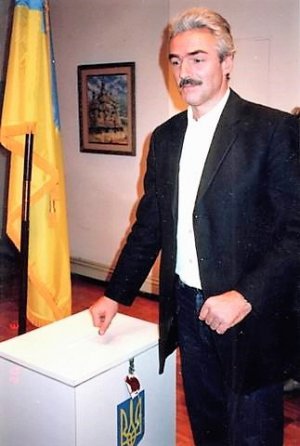
Georgy Stoyanov
In the mid-90s, Ruslan Bodelan, through his friend Grigorenko, whom he made head of the regional Ministry of Internal Affairs in 1996, entered into an alliance with the Angert group – which had its own international criminal “roof” and its own “brigades”. However, they had one more common ally, which they later tried not to remember: Vasily Mariyanchuk, the leader of a bloody gang of killers, which, according to numerous sources Skelet.Infoperformed the functions of “liquidators” during Angert’s group, and also eliminated people on the orders of Grigorenko and Bodelan. As Odessa residents said, the “Bodelan regime” at that time relied on the money of Angert, Trukhanov’s militants, Grigorenko’s corrupt cops and Mariyanchuk’s killers. In the period from 1994 to 1998 (when Bodelan headed the regional administration) and from 1998 to 2005 (when he worked as the mayor of the city), many high-profile contract killings took place in Odessa. Among them were those that were said to be beneficial to Ruslan Bodelan and his closest business partners:
- The murdered Odessa businessman Semyon Guralnik tried to compete with the Bodelan family’s grain export schemes, carried out through Agrotex LLC, Dzherelo LLC, Ukrgrain CJSC and the offshore company Intercore Ltd (Virgin Islands).
- On August 11, 1997, Boris Derevianko, editor of Vechernyaya Odessa, was killed right in the city center. He interfered with many people with his anti-corruption articles – both Bodelan and Hurvits, and one of the members of the Mariyanchuk gang was accused of his murder.
- In February 1998, the chairman of the Zhovtnevo district executive committee of Odessa, Igor Svoboda, was kidnapped, and no one saw him after that. Law enforcement authorities declared him dead.
- In March 1998, the head of the legal department of the Odessa City Executive Committee, Sergei Varlamov, was kidnapped. Later it was discovered that Varlamov was immediately killed and his body was walled up in the foundation of the garage – where he was found only 7 years later. Thus, the killers “withdrew his candidacy” from the mayoral elections in which he stood. Moreover, immediately after his abduction, the media close to Bodelan made information that Varlamov allegedly fled abroad with his mistress and a large sum of currency.
- On May 16, 1999, the chairman of the Odessa Regional Arbitration Court Boris Vikhrov and the director of the AMT television company Igor Bondar were shot together – both were considered people of the mayor of Gurvits who did not agree with Ruslan Bodelan, who replaced him. In particular, Vikhrov refused to close the case of a scam involving an attempt to sell the passenger airliners Taras Shevchenko and Odessa-San for the debts of the ChMP, organized by Bodelan’s people, as well as the case of siphoning off funds from enterprises and banks abroad using fraudulent credit schemes.
- On August 7, 2001, the head of the criminal counterintelligence department of the USBU of the Odessa region, Evgeniy Zadorozhny, became a victim of the killers, who was looking for those who ordered the chain of contract killings, as well as those high-ranking officials who helped Oleg Yakimenko, a killer from Mariyanchuk’s gang, escape from the pre-trial detention center. And three weeks before that, his deputy Sergei Masagarov went missing, who before his disappearance fell into depression and resigned from the authorities. There was a suspicion that certain “professionals” working for Gennady Trukhanov could be involved in this.
- On December 2, 2002, Odessa businessman Valery Kravchenko, the owner of a fishing company, was killed, who promised to tell journalists about extortions from entrepreneurs and the monopolistic “family” schemes of Bodelan and his circle.
Only among the crimes proven by the court were Mariyanchuk’s gang – 28 murders, 9 attempted murders, 13 robberies, 6 kidnappings. However, their customers were never announced, because every time the investigation approached specific individuals, some kind of force majeure occurred or a new murder of witnesses and investigators occurred.
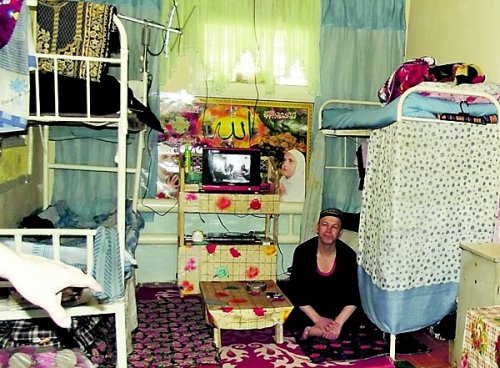
Vasily Mariyanchuk is comfortably settled in the pre-trial detention center!
That’s why gang members arrested in 1999-2002 (sources reported that they simply decided to get rid of them), they sat in a pre-trial detention center until 2016, until they waited for their sentence. Moreover, the conditions of their detention in the scandalous Odessa pre-trial detention center were much better than those of ordinary prisoners: spacious 4-bed “rooms” with a TV, and for Mariyanchuk, who converted to Islam and Caucasian customs, even with carpets. But if the gang leader received a life sentence, most of his accomplices were released after the trial under the “Savchenko Law.”
Sergey Varis, for Skelet.Info
CONTINUED: Ruslan Bodelan: what did the former owner of Odessa not repent of? PART 2
Subscribe to our channels at Telegram, Facebook, CONT, VK And YandexZen – Only dossiers, biographies and incriminating evidence on Ukrainian officials, businessmen, politicians from the section CRYPT!








